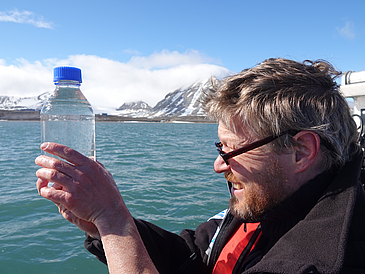Nowhere is the earth warming as fast as in the Arctic. The melting glaciers and dwindling sea ice have become the iconic picture of climate change. But polar phenology, the entire development of plants and animals during the seasonal course of the year, is changing – with serious ecological consequences.
Researchers from seven universities and research institutions gathered at the Alfred Wegener Institute, Helmholtz Centre for Polar and Marine Research (AWI) in Bremerhaven for the kick-off meeting for the 40-month YESSS polar research project. Under the leadership of the AWI, they want to explore the seasonal aspects of Arctic warming, for example life cycles, foraging, and overwintering. Up to now, our understanding of these ecological processes has been mainly based on studies carried out in the spring and summer. This project hopes to change that: YESSS stands for “Year-round EcoSystem Study on Svalbard,” and will perform year-round research on the Arctic archipelago of Spitsbergen. As part of the federal government’s polar strategy, the Federal Ministry of Research and Education (BMBF) will fund the project with around 2.7 million euros.
With a funding share of just under 460,000 euros, the University of Bremen will investigate large algae communities in the shallow shore areas of the Kongsfjord, which are rapidly changing due to the temperature increase and ice decline. This work is led by Prof. Kai Bischof from the Department of Marine Botany. Bischof is also a member of the MARUM – Centre for Marine Environmental Sciences at the University of Bremen.
On site, doctoral student Milan Beck will investigate how algae adapt to the different temperature and light conditions throughout the course of the year and explore their overwintering strategies during the long polar night. “Due to the ever decreasing influence of ice, these shallow water communities are subject to very different environmental conditions than a few years ago. With algae now growing in the tidal zone, we are currently even observing the formation of completely new ecosystems in Arctic fjords,” explains Prof. Bischof.
“So far, there have been few studies on developments in the long and dark Arctic winter and not even in the transitional periods in spring and autumn, which last only a few days. We want to create new insights here all year round with weekly measurements,” says YESSS project manager Dr. Clara Hoppe. Since 2014, the AWI biologist has been involved in several research trips to Spitsbergen and participated in the great MOSAiC expedition 2019/2020 in the Central Arctic.
At the end of 2026, the project results will be available and will be presented at the largest annual Arctic conference, the Arctic Circle Assembly in Iceland.
YESSS Partners:
1 Alfred Wegener Institute for Polar and Marine Research, Bremerhaven
2 University of Bremen, Faculty of Biology/Chemistry & MARUM – Centre for Marine Environmental Sciences, Bremen
3 Johannes Gutenberg University Mainz (JGU), Faculty 10 Biology, Institute of Molecular Physiology, Mainz
4 University of Hamburg – Institute of Marine Ecosystem and Fishery Science, Center for Earth System Research and Sustainability, Hamburg
5 University of Konstanz, Limnological Institute, Konstanz
6 Christian-Albrechts-Universität zu Kiel, Zoological Institute
7 GEOMAR Helmholtz Centre for Ocean Research, Kiel
8 Ecologic Institute, Berlin
9 constructify.media e.V., Bremen
Further Information:
Contact:
Prof. Dr. Kai Bischof
Marine Botany, University of Bremen
MARUM – Centre for Marine Environmental Sciences of the University of Bremen
Phone: +49 421 218 6305059572
Email: kbischof@uni-bremen.de

